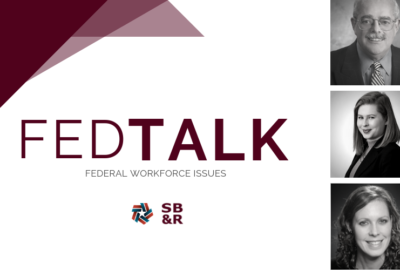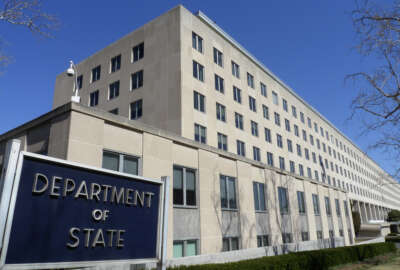Rep. Connolly demands to know if the DHS IG is under investigation
In today's Federal Newscast, a Virginia congressman demands to know if the Homeland Security Inspector General is under investigation. And the IRS is looking to...
Best listening experience is on Chrome, Firefox or Safari. Subscribe to Federal Drive’s daily audio interviews on Apple Podcasts or PodcastOne.
- Is the Department of Homeland Security’s inspector general under investigation? That’s what Rep. Gerry Connolly (D-Va.) wants to know. He wrote to Kevin Winters, the chairman of the Council of the Inspectors General on Integrity and Efficiency. Connolly, the chairman of the Oversight and Reform Subcommittee on Government Operations is seeking public confirmation about the investigation of Joseph Cuffari and any details the Integrity Committee can share. Cuffari is under fire for allegedly not informing Congress about problems with the investigation into the January 6 attack on the Capitol. Connolly is asking Winters to respond by Aug. 24.
- The Army Corps of Engineers plans to take on 11 types of programs as part of the Biden administration’s Justice40 initiative. Justice40 consists of hundreds of programs that benefit the climate, clean energy, affordable housing and other investments to help disadvantaged communities.
- The Army National Guard is trying out a new child care option for parents who serve. Parents in the Army National Guard in six states, including Massachusetts and Washington State, will be able to access child care during their weekend drill sessions starting Sept. 1. The care will be free to the service members for children from six weeks to 12-years-old. Currently 118,000 Army National Guard members are parents. About 9% of those are single parents. Child care availability has been a serious issue for service members in the military for years. Many have trouble finding adequate care for the demands of their jobs.
- A public database of federal employees now has one more advanced search capability. The Office of Personnel Management added a new search tool to its online federal employee database, “FedScope.” The new filter can locate federal employees who do not currently have union representation. The National Federation of Federal Employees previously requested the feature, and said the update promotes the unionization of more than 300,000. The federal union said it plans to use the search function to locate and better reach those employees.
- The Labor Department is launching several initiatives to try to expand the use of its registered apprenticeship program. The agency launched new branding for the program, called “ApprenticeshipUSA,” aiming to establish a better understanding of the registered apprenticeship online system. Labor’s apprenticeship program is designed to offer more paid work opportunities, classroom experience and credentials to job seekers.
- The IRS is looking to expand its use of video conferences, something that increased during the pandemic. The agency uses the platform to talk with taxpayers during appeals and is now updating its guidelines on video conferences to make them a permanent option.
- The Office of Federal Contract Compliance Programs (OFCCP) revised its directive on Pay Equity Audits. OFCCP wants to clarify guidance that in order to determine if contractors met their obligation to conduct a compensation analysis, OFCCP requires certain documentation to demonstrate compliance. OFCCP Director Jenny Yang said that when the agency identifies pay-related concerns during compliance evaluations, they discover that contractors have not performed any analysis of pay systems or have not adequately analyzed their compensation system, which, if performed, will improve pay equity.
- The State Department is looking to transform the way it carries out its diplomatic mission, starting with its workforce. Ambassador Marcia Bernicat, the director general of the Foreign Service and the director of the Global Talent Management Bureau, said the COVID-19 pandemic expedited the need for the department to create a hybrid workforce. “If a job can be done primarily through telework, then we don’t need to have the position based overseas. We want our folks who are overseas to be actively engaged and present in the workplace,” Bernicat said. Bernicat added that telework allows the department to make better use of all its employees and that more domestic employees are teleworking overseas. (Federal News Network)
- The rate of inflation is higher than what the Postal Service anticipated and it’s taking a financial toll. The USPS inspector general’s office found that inflation mostly impacts the agency’s labor costs, which last year accounted for two-thirds of its $82 billion in expenses. An IG report found inflation will also factor into what USPS pays into retirement benefits and workers’ compensation, which made up nearly 10% of its expenses last fiscal year. Postmaster General Louis DeJoy recently cited inflation as one of the drivers behind higher mail rates that will go into effect in January 2023.
- NASA has laid out its plan for a major IT services contract recompete. Vendors sharpen your pencils because NASA is about to release the draft solicitation for its Consolidated Applications and Platform Services or NCAPS program. The space agency said a draft request for proposals will be out on or about August 29 and a final RFP is scheduled to be released on or about October 12. Under NCAPS, NASA wants enterprise IT services, including security, application, web and platform services, data analytics, automation and much more for all of its centers. The contract is a follow on and expansion of a contract awarded to SAIC in 2011 for $321 million.
- The General Services Administration is developing bots to make procurement easier. The agency is exploring using robotic process automation (RPA) to streamline invoice processing, freeing up humans to work on more complicated tasks. Senior procurement executive Jeff Koses said that the introduction of RPA has allowed GSA’s workforce to spend its time negotiating and administering contracts.
- Sen. Maggie Hassan (D-NH) and Sen. Rand Paul (R-KY) introduced a bipartisan bill that they hope will save taxpayers money and cut waste by eliminating duplicative government programs. If passed, the Annual Duplication Report Act of 2022 will implement a national coordination strategy to curb diet-related chronic health conditions. Currently there are 200 separate efforts that exist across 221 agencies. It would also establish a task force to provide consistent federal policies and goals for programs exploring alternatives to radiation-related technologies. The bill calls for implementing a pilot program through the Department of Energy to examine a cheaper, safer alternative for nuclear waste disposal.
Copyright © 2025 Federal News Network. All rights reserved. This website is not intended for users located within the European Economic Area.
Peter Musurlian
Peter Musurlian is a producer at Federal News Network.
Follow @PMusurlianWFED
Related Stories
Exclusive
Hiring/Retention
Read more
State Dept’s top HR official outlines vision to rebuild diplomatic workforce
Related Topics
Agency Oversight
All News
apprenticeships
Army Corps of Engineers
Army National Guard
child care
Congress
council of the inspectors general on integrity and efficiency
Department of Homeland Security
Federal Drive
Federal Newscast
Fedscope
General Services Administration
Gerry Connolly
House Oversight and Government Reform Committee
inflation
IRS
Joseph Cuffari
Justice40
Labor Department
Management
Marcia Bernicat
military families
NASA
Office of Federal Contract Compliance Programs
Office of Personnel Management
pay equity
People
Postal Service
robotic process automation
State Department
Tom Temin
web and video conferencing
Workforce






